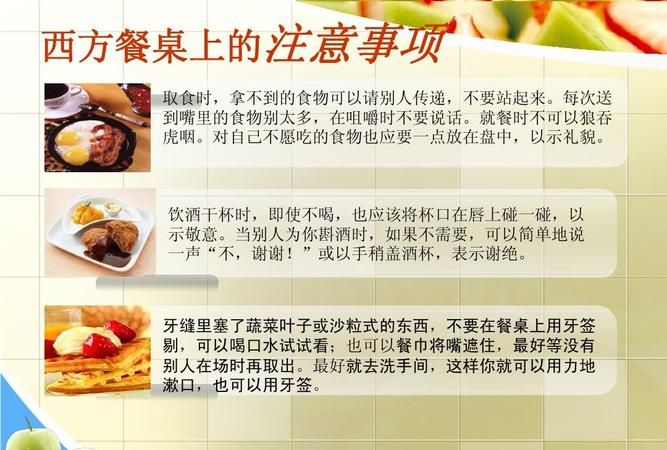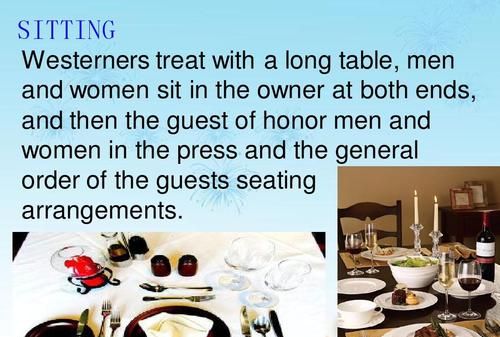本文目录
中国餐桌礼仪英语10句简单
1.让客人和长辈先吃每一道菜
let the elder people and the customer eat first
2.不要用筷子敲碗
don't use the chopsticks hit the bowl
3.不要将手伸到饭桌对面夹菜
don't reach to get the food on the opposite side
4.等大家到齐了,才开始吃
don't eat until everyone is there
5.为主人的长寿、健康、成功干杯
wish for the people who host the dinner
久仰,久仰!
I have long been looking forward to meeting you.
I have long desired to meet you.
久违了。
I haven’t seen you for ages/for a long time.
It’s been such a long time since we met last time.
久闻大名。
I’ve heard a lot about you.
这次由我负责全程陪同你们。
I will be with you for the entire visit/trip.
欢迎你到中国来。一路上辛苦了! / 一路上还好吧?
Welcome to China.I hope you’ve had a good flight.
或I hope you enjoyed your flight. / How was your journey?
谢谢你专程来接我。
Thank you very much for coming all the way to meet me.
您贵姓?/您怎么称呼?
May I know your name,please?
很高兴见到你。您怎么称呼7
Glad/Pleased to meet you,Misterr…?(可以用拖长问话的办法来询问对方的姓名)
中国有句古话说:“有朋自远方来不亦乐乎?”
There’s an old saying in Chinese which goes: “Isn’t it a great pleasure/joy to have friends coming from afar?
As a Chinese saying goes, “Nothing is more delightful than meeting friends from far away.”
这是给您准备的日程安排.我们简单过一遍吧。如果你有什么特殊要求.也可以告诉我。
This is the tentative itinerary/schedule I have prepared for you.Let’s go through it
together.If there is any special request,just let me know.
如果有什么需要帮忙的.尽管说。
If you need anything,don’t hesitate to ask.
Just let me know if you need anything.
我们安排你住在城里的……酒店.离我们公司开车要走40分钟。
We’ve arranged for you to stay in…Hotel,which is in the downtown area,about 40- minute drive from our company.
我们也有宾馆,不过条件不如酒店。离单位倒是很近.走路就可以到。
We have our own guest house,but there is no comparison between the two, only the guest house is within walking distance of the workplace.
除了正式会谈以外.我们也为大家安排了一些游览活动。
In addition to official meetings,we have also arranged some sightseeing.
我期待着您的再次来访。
I’m looking forward to your visit again.
代我向……问好。
Remember me to… / Say hello to…for me.
不用谢,这是我们应该做的。
Don’t mention it. It’s my pleasure.
欢迎再来!
Do come again.

各国餐桌礼仪英语
关于各国餐桌礼仪英语
每个国家在餐桌上都有哪些礼仪呢?下面由我为大家整理的各国餐桌礼仪英语,欢迎大家查看!

Britain
英国
Always: Eat with your fork in your left hand and knife in your right.
√左手持叉,右手持刀。
Never: Speak with your mouth full.
×说话时嘴里塞满了食物。
Denmark
丹麦
Always: Place your fork downwards on a plate if you want seconds.
√若要添菜,可将餐叉朝下,置于盘上。
Never: Take the last item on any given plate. You must continue to halve it until only crumbs are left.
×取走盘中最后一份食物。若盘中留下一人份时,可考虑分而食之。
Japan
日本
Always: Indulge in slurping. It is considered polite.
√吃饭大声咂吧,在日本被视为礼貌之举。
Never: Pour yourself a drink. It is tradition to pour drinks for one another.
×自己倒饮料。食客为彼此倒饮料,才符合传统习俗。
Thailand
泰国
Always: Consider meals as a social event where only the person perceived as the riches pays.
√饭局其实是个社交场合,最有钱的那个自然会买单。
Never: Leave your chopsticks in the bowl. It symbolises death.
×将筷子插在碗中,那很不吉利。
Mexico
墨西哥
Always: Wait for your host to say ‘Buen Provecho’ (Enjoy your meal) before eating.
√等主人说完“用餐愉快”(Buen Provecho)后,再开始吃喝。
Never: Arrive on time. Arrive 30 minutes late, if not later.
×准时赴宴。迟到30分钟以上,并不为过。
Middle East
中东
Always: Eat your meal in silence.
√用餐时保持安静。
Never: Pass food with your left hand.
×用左手递食物。
Germany
德国
Always: Cut as much food as possible with your fork to compliment the cook that the food is tender.
√取食时,能切多大切多大。在德国,这意在称赞厨师技艺高超,做出的料理入口即化。
Never: Cut lettuce in a salad. Fold it with a fork.
×吃沙拉时切生菜。食客不妨用餐叉叉起食用。
Mongolia
蒙古
Always: Keep your palm facing up when holding cups.
√持杯时,手掌朝上。
Never: Spill milk or dairy products. It is considered bad luck.
×将牛奶或乳制品洒在地上。蒙古人认为,这会带来厄运。
Kenya
肯尼亚
Always: Wash your hands before eating: a basin may be brought to the table for you.
√餐前洗手。餐桌上甚至备有洗手盆。
Never: Eat before the eldest male. He must eat first before anyone else can start.
×抢在最老的男性长辈前用餐。要知道,家中最老的'男性长辈享有优先用餐权。
Chile
智利
Always: Let the woman sit down before the men.
√邀请女士先入座。
Never: Speak with cutlery in your hands.
×手持刀叉,与他人交谈。
与餐桌礼仪有关的英语单词
有关餐桌礼仪的英语单词如下:
1、碟子:saucer; small plate; small dish
2、女主人:hostess; mistress; goodwife; woman of the house; housemistress
3、离席:leave the table or a meeting
4、汤盘:soup plate; soup dish
5、服务生:a boy in buttons
6、餐巾:(table) napkin; dinner cloth
7、油渍:oil stain
8、坐定:take seat; be sure
9、可使用:workability; workableness; in commission
10、摊开:spread out; unfold; lay open

具体的餐桌礼仪介绍如下:
1、撕面包时,碎屑应用碟子盛接,切勿弄脏餐桌。
翻译:when the bread is torn, the chips should be used to hold the dishes. Do not dirty the table.
2、用餐后,须等男、女主人离席后,其他宾客方可离席。
翻译: after dinner, wait for the male and female hostess to leave, the other guests can leave.
3、面包切用刀子割。
翻译:cut the bread with a knife.
4、如面包是烤热的,可以整片先涂牛油,再撕成小片吃。
翻译:if the bread is roasted hot, the whole piece can be first coated with butter and then ripped into small pieces.
5、汤将见底,可将汤盘用左手拇指和食指托起,向桌心,即向外倾斜,以便取汤。
翻译:The soup will reach the bottom. The soup tray can be held up with the left thumb and forefinger and tilted outward toward the center of the table so as to fetch the soup.
6、在饭店用餐,应由服务生领台入坐。
翻译:Dining in restaurants should be served by the waiter.
7、餐巾主要防止弄脏衣服,兼做擦嘴及手上的油渍。
翻译:napkins mainly prevent dirty clothes, and do wipe the mouth and hands of oil stains.
8、必须等大家坐定后,才可使用餐巾。
翻译:you must wait until you have settled down before you can use napkins.
9、餐巾摊开后,放在双膝上端的大腿上,切勿系入腰带,或挂在西装领口。
翻译:After the napkin is spread out, put it on the thigh on the top of your knees. Do not tie it in the belt or hang it on the collar of the suit.
10、餐毕,宜将餐巾折好,置放餐桌上再离席。
翻译:when the meal is finished, fold the napkin and put it away on the table.
英语餐桌礼仪
关于英语餐桌礼仪
Britain
英国
Always: Eat with your fork in your left hand and knife in your right.
左手持叉,右手持刀。
Never: Speak with your mouth full.
说话时嘴里塞满了食物。
Denmark
丹麦
Always: Place your fork downwards on a plate if you want seconds.
若要添菜,可将餐叉朝下,置于盘上。
Never: Take the last item on any given plate. You must continue to halve it until only crumbs are left.
取走盘中最后一份食物。若盘中留下一人份时,可考虑分而食之。
Japan
日本
Always: Indulge in slurping. It is considered polite.
吃饭大声咂吧,在日本被视为礼貌之举。
Never: Pour yourself a drink. It is tradition to pour drinks for one another.
自己倒饮料。食客为彼此倒饮料,才符合传统习俗。
Thailand
泰国
Always: Consider meals as a social event where only the person perceived as the riches pays.
饭局其实是个社交场合,最有钱的那个自然会买单。
Never: Leave your chopsticks in the bowl. It symbolises death.
将筷子插在碗中,那很不吉利。
Mexico
墨西哥
Always: Wait for your host to say ‘Buen Provecho’ (Enjoy your meal) before eating.
等主人说完“用餐愉快”(Buen Provecho)后,再开始吃喝。
Never: Arrive on time. Arrive 30 minutes late, if not later.
准时赴宴。迟到30分钟以上,并不为过。
Middle East
中东
Always: Eat your meal in silence.
用餐时保持安静。
Never: Pass food with your left hand.
用左手递食物。
Germany
德国
Always: Cut as much food as possible with your fork to compliment the cook that the food is tender.
取食时,能切多大切多大。在德国,这意在称赞厨师技艺高超,做出的料理入口即化。
Never: Cut lettuce in a salad. Fold it with a fork.
吃沙拉时切生菜。食客不妨用餐叉叉起食用。
Mongolia
蒙古
Always: Keep your palm facing up when holding cups.
持杯时,手掌朝上。
Never: Spill milk or dairy products. It is considered bad luck.
将牛奶或乳制品洒在地上。蒙古人认为,这会带来厄运。
Kenya
肯尼亚
Always: Wash your hands before eating: a basin may be brought to the table for you.
餐前洗手。餐桌上甚至备有洗手盆。
Never: Eat before the eldest male. He must eat first before anyone else can start.
抢在最老的男性长辈前用餐。要知道,家中最老的男性长辈享有优先用餐权。
Chile
智利
Always: Let the woman sit down before the men.
邀请女士先入座。
Never: Speak with cutlery in your hands.
手持刀叉,与他人交谈。
英语介绍中国餐桌礼仪
I believe the Chinese food is famous around the world.中国饮食在世界上是很有名的。
And if you are in China and you are asked by your Chinese friend to a dinner, you may want to know how to pick up your seat at the table and what is the proper way to sit at the table.假如你来到中国,中国朋友请你吃饭,你就需要了解一下有关宴会中的座次问题。
Well, normally this seat is the seat for the host or the hostess.这个位子一般是主位,是主人的.。
The seat is facing the door of this room.这个位子面朝着门。(面朝着门的一般是主位。)
One may also distinguish the seats at the table from the style in which the napkins are folded.也可以根据餐巾的样式来辨别座位。
Regardless of how the napkins are arranged.,the tallest arrangement will always correspond to the master seat.无论餐巾折成什么样式,最高的餐巾对应的座位,一定是主位。
At the small table, a table for four of five, the seat right across of the host seat, the seat over there, the back of which is facing the door is the seat for the main guest.一张坐四五个人的小桌子,与主人的座位相对应的背对着门的那个位置则是被邀请的主客坐的位置。
But usually of course, when it’s a bigger table, a table for ten or twelve, and it is not easy for host or hostess talking with the main guest, right across the table like right across the ocean and they can just sit side by side which can make it easier for them to talk.
当然如果桌子大一点的时候,比如说可以坐十到十二个人的桌子,由于主人和客人说话不太方便,跨越桌子就像跨越一片大海一样,所以他们可以挨着坐,这种情况下是可以挨着坐的,这样坐主人和客人说话更方便一些。

以上就是关于用餐礼仪英语怎么写,中国餐桌礼仪英语10句简单的全部内容,以及用餐礼仪英语怎么写 的相关内容,希望能够帮到您。

